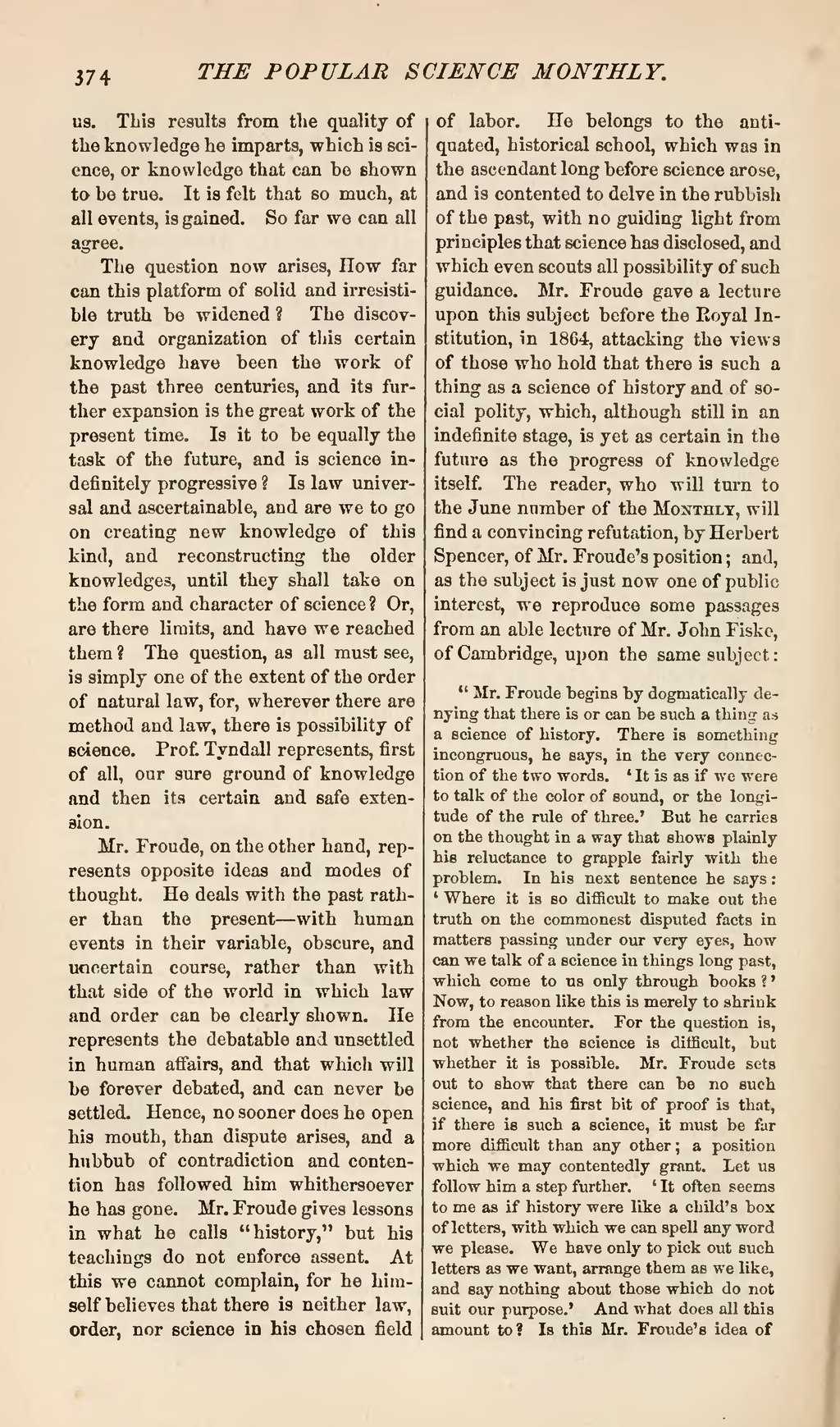us. This results from the quality of the knowledge he imparts, which is science, or knowledge that can be shown to be true. It is felt that so much, at all events, is gained. So far we can all agree.
The question now arises, How far can this platform of solid and irresistible truth be widened? The discovery and organization of this certain knowledge have been the work of the past three centuries, and its further expansion is the great work of the present time. Is it to be equally the task of the future, and is science indefinitely progressive? Is law universal and ascertainable, and are we to go on creating new knowledge of this kind, and reconstructing the older knowledges, until they shall take on the form and character of science? Or, are there limits, and have we reached them? The question, as all must see, is simply one of the extent of the order of natural law, for, wherever there are method and law, there is possibility of science. Prof. Tyndall represents, first of all, our sure ground of knowledge and then its certain and safe extension.
Mr. Froude, on the other hand, represents opposite ideas and modes of thought. He deals with the past rather than the present—with human events in their variable, obscure, and uncertain course, rather than with that side of the world in which law and order can be clearly shown. He represents the debatable and unsettled in human affairs, and that which will be forever debated, and can never be settled. Hence, no sooner does he open his mouth, than dispute arises, and a hubbub of contradiction and contention has followed him whithersoever he has gone. Mr. Froude gives lessons in what he calls "history," but his teachings do not enforce assent. At this we cannot complain, for he himself believes that there is neither law, order, nor science in his chosen field of labor. He belongs to the antiquated, historical school, which was in the ascendant long before science arose, and is contented to delve in the rubbish of the past, with no guiding light from principles that science has disclosed, and which even scouts all possibility of such guidance. Mr. Froude gave a lecture upon this subject before the Royal Institution, in 1864, attacking the views of those who hold that there is such a thing as a science of history and of social polity, which, although still in an indefinite stage, is yet as certain in the future as the progress of knowledge itself. The reader, who will turn to the June number of the Monthly, will find a convincing refutation, by Herbert Spencer, of Mr. Froude's position; and, as the subject is just now one of public interest, we reproduce some passages from an able lecture of Mr. John Fiske, of Cambridge, upon the same subject:
"Mr. Froude begins by dogmatically denying that there is or can be such a thing as a science of history. There is something incongruous, he says, in the very connection of the two words. 'It is as if we were to talk of the color of sound, or the longitude of the rule of three.' But he carries on the thought in a way that shows plainly his reluctance to grapple fairly with the problem. In his next sentence he says: ’Where it is so difficult to make out the truth on the commonest disputed facts in matters passing under our very eyes, how can we talk of a science in things long past, which come to us only through books?' Now, to reason like this is merely to shrink from the encounter. For the question is, not whether the science is difficult, but whether it is possible. Mr. Froude sets out to show that there can be no such science, and his first bit of proof is that, if there is such a science, it must be far more difficult than any other; a position which we may contentedly grant. Let us follow him a step further. 'It often seems to me as if history were like a child's box of letters, with which we can spell any word we please. We have only to pick out such letters as we want, arrange them as we like, and say nothing about those which do not suit our purpose.' And what does all this amount to? Is this Mr. Froude's idea of

